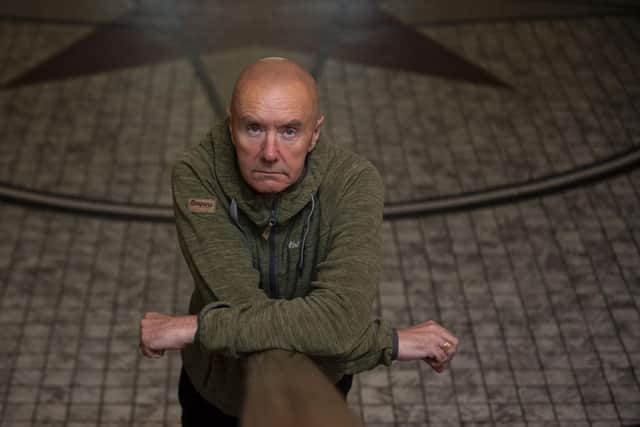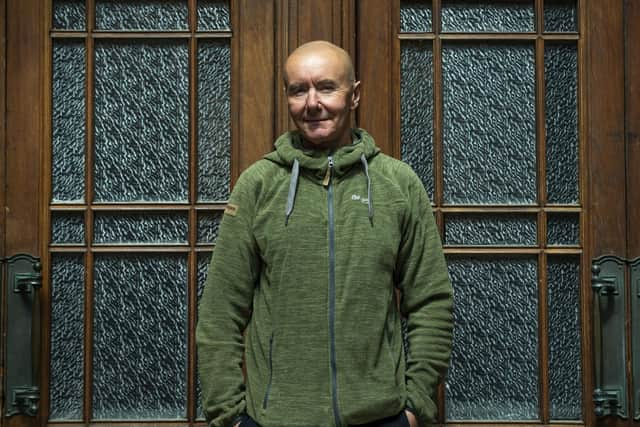Exclusive:Irvine Welsh on 30 years of Trainspotting, its Booker Prize snub and why he preferred writing to partying
and live on Freeview channel 276
It was the trailblazing Scottish novel that took Britain’s publishing scene by storm when it arrived in bookshops 30 years ago.
Irvine Welsh’s Trainspotting would go to sell more than a million copies in the UK, spawning hugely successful stage and screen adaptations, and sparking a writing career that is still going strong.
Advertisement
Hide AdAdvertisement
Hide AdBut the Edinburgh author said he believed it would have turned out very differently had he not been shunned by the literary establishment with his first novel, which followed a group of young heroin addicts in his native city.


He also admitted he feared he would not have survived if his overnight success had come when he was in his early 20s, rather than his early 30s, as he was more interested in writing than partying when the book came out in 1993 – three years after Welsh finished writing it.
Speaking at an event to mark the 30th anniversary of Trainspotting’s publication, Welsh said he only knew a new book was good enough if he was worried what the reaction might be.
Welsh was appearing at the Virgin Edinburgh Hotel alongside Kevin Williamson, the writer and publisher who first championed his work in the early 1990s magazine Rebel Inc.
Advertisement
Hide AdAdvertisement
Hide AdRecalling the swift success of the book, Welsh said: “It was a strange thing, but the good thing about it was that it happened to me in my early 30s.


"If it had happened to me in my early 20s, I would have been f****** dead – there's no question about it. But I’d done the excessive drugs, making a **** of myself and fannying about.
"I remember when Oasis had a hit with Whatever, I was at their party. I was watching the two Gallagher brothers, one of whom was 26 or 27, and the other was 20 or 21.
"The older one looked so comfortable, as if he had been rehearsing for it his whole life. He knew what he was going to say and what he was going to do. The younger guy had basically been at school then on the dole. He’d had no preparation or training for it. I really felt for him.
Advertisement
Hide AdAdvertisement
Hide Ad"I was very fortunate to get that kind of attention when I was in my early 30s. I'd had a lot of experience of life by then. I’d found something I really wanted to do that I could do. I just fired on with it and kept writing.


“The buzz of going out partying, and dipping into that high life, was nothing compared to the excitement of being able to sit down and get on with work. I’ve constantly moved on to the next project.”
Welsh, who has published 14 novels to date, told the sell-out event that he got one of the biggest breaks of his career when Trainspotting failed to make the shortlist for the Booker Prize after two judges failed to quit in protest at its possible inclusion because they were so offended by its content.
He recalled: “The chair of the Booker Prize – Grey Gowrie – got in touch to tell me that two judges had threatened to walk off the panel if Trainspotting was on the shortlist. They didn’t want to split the panel, so they took it off instead.
Advertisement
Hide AdAdvertisement
Hide Ad“It was one of the best things that could have happened to me as it cemented me as this underground writer who was too hot for the literary establishment to handle, which was rubbish in some ways, but it was very good for me.
“I would have just been another guy who had been shortlisted for the Booker Prize or had won it. It's like a snooty school prefect's badge in the literary world. I don’t think it particularly does working-classic writers any good, if you look at James Kelman and Graham Swift. They were never exalted into that sort of bracket, like Oxbridge writers were.”
Welsh, who was born in Leith, cited his upbringing in Muirhouse and the encouragement to read by his parents had been his biggest influences.
Welsh said: “I was just so relieved to get Trainspotting out. You have this thing when you write a book when you think ‘my mum’s going to hate it, my wife’s going to hate it’. They’re going to think I’m weird. It’s a great feeling to have as a writer.
Advertisement
Hide AdAdvertisement
Hide Ad"If I finish a book and I don’t have that feeling of ‘for f**** sake, what’s everybody going to think of me, what's everybody going to say?’ then I know the book’s not very good. You have this terrible feeling, which paradoxically is a great feeling. It shows that I have moved out of my kind of comfort zone a little bit.”
Williamson suggested few books published in modern times had “transcended” the era it emerged from and “penetrated the public consciousness” over the past 30 years like Trainspotting. He compared the novel’s prolonged impact to George Orwell's 1984, which was published in 1949, and Robert Louis Stevenson’s Strange Case of Dr Jekyll and Mr Hyde.
Welsh said: “I’ve had a chance to think about the impact of Trainspotting. I used to think that its success down the generations was because it was a book about drugs and intoxication, then I thought it was a book about the celebration of youth, the power of being young and the stupid things you do.
“Then I realised that what’s it about is people trying to adjust to a world without work. The industrial working classes were the first phase of that. We are still transforming from one type of world into another.
Advertisement
Hide AdAdvertisement
Hide Ad"I think that’s what the book is fundamentally about and why it’s stood the test of time. People are worried about their purpose in life and whether they are replaced by AI [artificial intelligence], robots and all that.”
Comment Guidelines
National World encourages reader discussion on our stories. User feedback, insights and back-and-forth exchanges add a rich layer of context to reporting. Please review our Community Guidelines before commenting.
